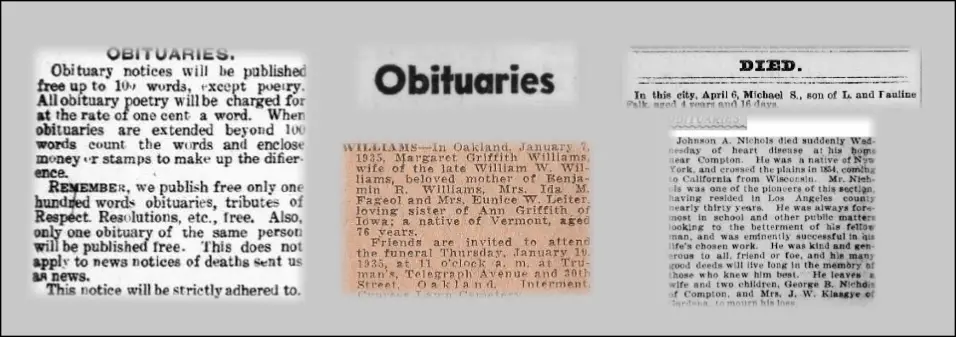
A Focused Guide from the Newspaper Research Academy
Introduction – The Obituary Is Only the Beginning
When a loved one died, the obituary was only one of many newspaper traces left behind. In fact, dozens of other articles — often printed before or after the obituary — reveal details that never appeared in the formal death notice.
Funeral reports, resolutions of respect, estate sales, thank-you notes, and even church or club minutes often contain genealogical gold. By looking beyond the obituary, you can piece together the story of how a community marked a passing — and how it remembered a life.
Newspaper Articles That Chronicle a Death
Death and Funeral Notices
Usually printed within days of the event, these brief announcements include burial details, service times, and names of pallbearers or officiants — all valuable for identifying churches, cemeteries, and extended kin.
Funeral Reports and Sermon Summaries
Local reporters often covered funerals as community events, listing attendees, eulogists, or scripture references. A single sentence like “Rev. T. H. Ward preached from Psalm 23” can guide you to denominational records or parish archives.
Death Mentions in News Columns
In smaller towns, the “Local Happenings” or “Around Town” columns routinely listed deaths that never appeared elsewhere:
“Mr. J. H. Thomas passed away last Wednesday after a lingering illness.”
These can fill in gaps for years with missing records.
Coroner’s Inquests and Accident Reports
Unexpected deaths — accidents, poisonings, crimes — often generated full coverage with witness testimony and cause of death. These articles may be the only surviving record of the event and frequently name doctors, employers, or neighbors.
Probate, Wills, and Estate Notices
Legal sections announced wills, executors, or estate auctions. These notices connect the deceased to heirs, property, and business interests — offering insight into wealth, family structure, and residence.
Memorial and “In Memoriam” Articles
Families and organizations sometimes printed poetic or reflective memorials months later. Though sentimental, they may include maiden names, occupations, or civic affiliations otherwise omitted.
Club and Society Resolutions
Fraternal lodges, veterans’ groups, and religious circles issued “resolutions of respect” when a member died. They often recorded years of membership and offices held — useful for tracing social connections and affiliations.
Thank-You and Appreciation Notes
Families frequently placed “Card of Thanks” notices after a funeral to acknowledge kindnesses:
“The family of the late Mrs. L. J. Reynolds thanks friends and neighbors for their floral offerings.”
Signatures can confirm maiden names or relationships among survivors.
Anniversary and Retrospective Mentions
Editors occasionally revisited earlier obituaries: “One year ago today, our townsman J. C. Lathrop was called home.”
Such items confirm dates and signal which relatives still lived nearby.
Public Health and Epidemic Reports
During disease outbreaks, newspapers listed casualties collectively: “Influenza claims three more victims.”
Grouped by age, occupation, or street, these notices can help reconstruct entire neighborhoods affected by epidemics.
Cemetery and Burial Society News
Burial societies, cemetery boards, and church sextons published meeting notes and interment lists. Phrases like “Lot 42, Section B, purchased by…” can lead to plot ownership records and burial registers.
Related Social Mentions
After a death, travel notes, real estate transfers, or personal visits often marked a family’s adjustment:
“Mrs. Jane Foster returned home after attending her father’s funeral in Albany.”
These indirect mentions track migrations, marriages, or new households.
Summary Table – Where to Look Beyond the Obituary
| Article Type | What to Look For | Genealogical Clues |
|---|---|---|
| Funeral Reports | Lists of attendees, officiants, floral tributes | Church, relationships, residence |
| Coroner’s Inquests | Cause of death, witness names, verdict | Circumstances, occupation, associates |
| Probate Notices | Executors, heirs, estate sales | Family ties, property ownership |
| Memorials / Resolutions | Names, affiliations, quotations | Memberships, community status |
| Cards of Thanks | Signers, organizations thanked | Relationships, survivors |
| Anniversary Mentions | Reprints of obituaries, “one year ago” phrasing | Migration, local continuity |
| Public Health Lists | Grouped deaths by street or trade | Epidemics, neighborhoods affected |
Search Strategies That Work
| Challenge | Search Approach | Example Search |
|---|---|---|
| No formal obituary published | Search “funeral” OR “services held for” | “Services held for John Smith” |
| Death not indexed | Browse “Local News” or “Personal Items” sections | Mentions like “passed away” |
| Estate or probate details | Search “estate of [Name]” OR “executor of [Name]” | “Estate of Catherine H. Jones” |
| Collective or epidemic deaths | Search “victims” OR “influenza” + location | “Influenza victims” + Cleveland |
| Family acknowledgments | Search “Card of Thanks” OR “family of the late” | “Family of the late William Brown” |
Why These Mentions Matter
Each of these article types adds human depth missing from most obituaries. They reveal the networks that surrounded the deceased — the neighbors who helped, the clubs that mourned, and the family members who carried on.
By exploring these patterns, you’ll often uncover:
- Relationships hidden in thank-you notes or club resolutions
- Timelines refined by probate filings or death mentions
- Occupations and addresses buried in funeral or health reports
Takeaway
Never stop your search with the obituary. Death rippled through every corner of the newspaper — legal pages, society columns, even advertisements. Every mention, no matter how brief, contributes another piece to your ancestor’s story.
Next Steps & Related Resources
- Research Guides: ACA20 (Finding Obituaries), ACA80 (Death Mentions, Funerals & Memorials), ACA85 (Auctions, Estate Sales & Public Notices)
- eBooks: Hidden Gold — uncover overlooked article types; Name Games — decipher name distortions.
- Tools: Newspaper Keyword Compendium — expand searches with related death and memorial terms.
Improve your research skills at the Newspaper Research Academy